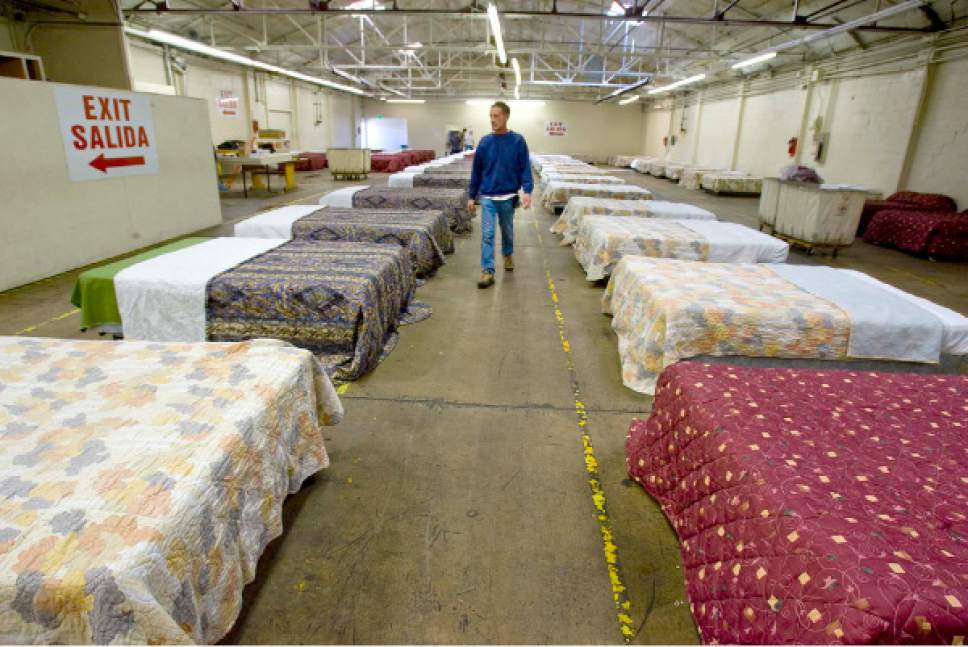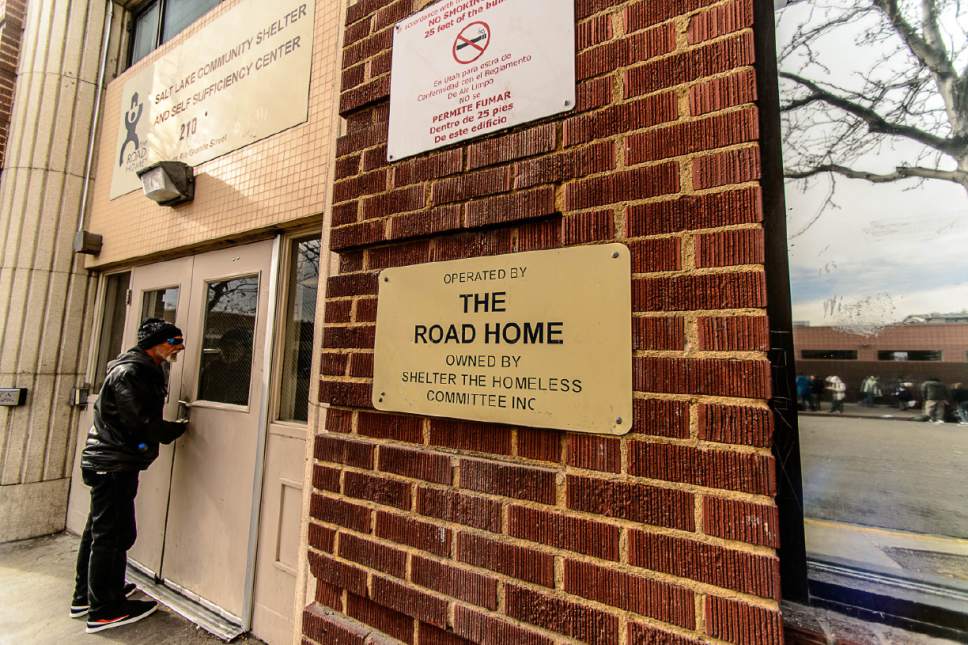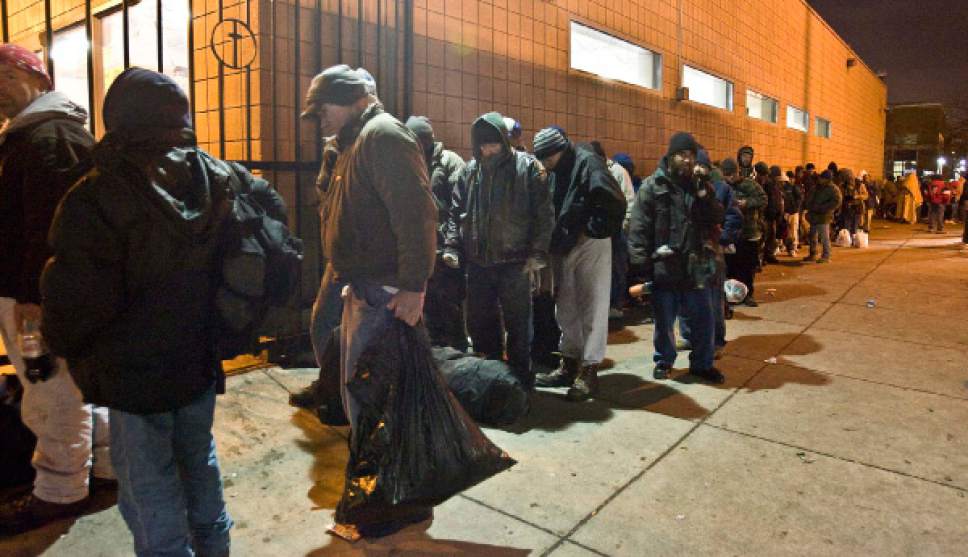This is an archived article that was published on sltrib.com in 2017, and information in the article may be outdated. It is provided only for personal research purposes and may not be reprinted.
Given an ultimatum to remove families from its downtown shelter by July 15 or lose its state-allocated funding, The Road Home may have to pay for motel stays that would eat into its budget for housing the homeless.
The notion of fast-tracking families from the 210 S. Rio Grande St. shelter to housing met little public opposition when it was announced in May — having derived from leaders' compassion for vulnerable people surrounded, at the shelter's perimeter, by lawbreaking and squalor.
Privately, though, some associated with the shelter have expressed concern.
The Road Home's 300-bed family shelter in Midvale is commonly full. If the homeless service provider can no longer accept families at its downtown shelter — and it doesn't turn them away — it will be forced to place in motels those families that it can't immediately find housing for. Motels are costly, relative to shelter stays, and affordable housing is increasingly scarce.
Should The Road Home admit a family downtown after July 15, it risks losing $2.4 million in state-allocated funds.
Nonetheless, Road Home Associate Executive Director Michelle Flynn said in an email to The Salt Lake Tribune that the agency will do its best for families in need.
"If a family shows up at the Salt Lake Community Shelter after July 15, our staff will transport them to the Midvale Center," Flynn wrote. "If we are full in Midvale, we will utilize motels."
Flynn said no families have been sent to motels yet, but the agency anticipates about a dozen won't find alternate housing by July 15. The staff is currently scouting motel options, she said.
In May, the state's Homeless Coordinating Committee allocated $750,000 in federal funds for the relocation of families at the shelter — between 12 and 22 per night in the last week, according to Flynn.
The Road Home has since agreed to use about two-thirds of those funds to hire new case managers (six, at a cost of $240,000), rapid rehousing ($125,000) and so-called "barrier-elimination fees" ($100,000) that would cover damage to a housing unit that exceeds the value of a deposit, missing or back rent, broken leases, lease initiation and holding fees.
Flynn said The Road Home is seeking clarification about the state's stipulation that The Road Home's newly vacated family beds "shall not be backfilled with other clients."
"It seems likely that using the space for individuals currently experiencing street homelessness will not be an option," she wrote. "We may be able to use some of the space for single women who are currently sleeping on cots in the women's shelter day room."
Christina Davis, a public information officer for the Department of Workforce Services, said Friday that the state is working with the city and the county to find additional funds for the effort.
The state recently broadened the terms of its contract with the County Housing Authority so that $125,000 earmarked for the chronically homeless can be used to help any member of the homeless population.
Salt Lake City spokesman Matthew Rojas said any city funding would support families "and increase the number of landlords willing to help with housing." County officials were not made available for comment Friday.
Road Home officials have said little as state, county and city leaders committed to various homeless-related goals over the last few months — including the June 30, 2019, closure of the Rio Grande shelter.
Most of those local leaders also sit on a nonprofit board that acts as The Road Home's landlord, and which will soon accept bids to operate two future shelters in Salt Lake City and another in South Salt Lake. The Road Home is thought a likely winner of one or more of those contracts.
Directors at the nonprofit Crossroads Urban Center have been the most vocal skeptics of plans to close the downtown shelter, which call for shelter beds to be reduced by up to 500.
Crossroads' Tim Funk said Friday the removal of families is another well-intentioned but ill-informed step in the dark.
"Crossroads has been here 50 years, and some of us have been here 30 years, and we've seen one service delivery plan after another come up short," Funk said. "We're just saying, realistically, we've got more people in more places across our city and in communities across the state than [we've] ever had."
Homeless families with children that were counted in Salt Lake City on a given night increased from 188 in 2016 to 198 in 2017. Families considered chronically homeless increased from six in 2016's one-night count to 22 in 2017.
Between Midvale and Salt Lake City, The Road Home has sheltered 123 families within the past week. Family members amounted to 466 people on the agency's busiest night. Of those, 397 actually received a bed.
Fifty-seven families left shelter between June 1 and June 25 — either to supported housing or their own solution — but 56 new families came in.
Seventeen other families were diverted through federal funding for homeless individuals with disabilities, disease or addictions.
Flynn said the intention of the family relocation effort is consistent with The Road Home's goals: to reduce time families are spending without homes and to support them with a housing search, subsidies and stability services.
"Our ongoing challenge in our community is to create more deeply affordable housing," she wrote. "We need good units that fall under the Fair Market Rent and will approve families who have experienced homelessness."
"Using motels is expensive. We need to ensure that we are able to make significant and sustained investment in housing."
The Road Home will receive less from the state than in past years for permanent housing (down from $769,000 to $723,000) and rapid rehousing (from $226,000 to $155,000).
It's also becoming harder to find housing that homeless families will be able to afford when short-term assistance runs out: Between 2005 and 2015, the Salt Lake City metro area saw a 26 percent decline in rental units costing less than $800 per month in inflation-adjusted 2015 dollars, and a 131 percent increase in those costing more than $1,000 per month, according to an annual report released recently by Harvard University's Joint Center for Housing Studies.
Another report from the National Low Income Housing Coalition found that in Salt Lake County, 2.6 full-time jobs at minimum wage are required to truly afford a two-bedroom apartment at the Fair Market Rate of $990 per month.
Twitter: @matthew_piper







